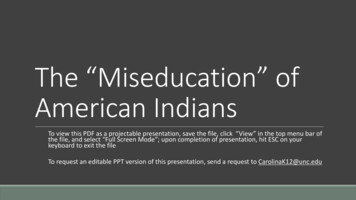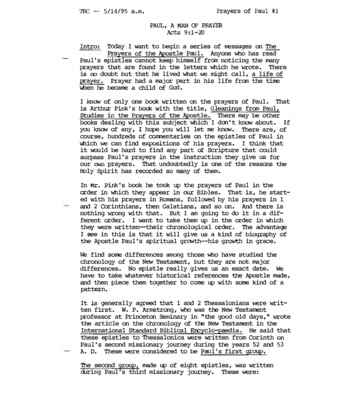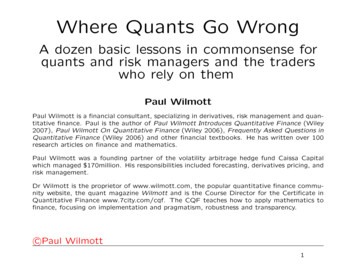
Transcription
COMPULSORY MISEDUCATIONPaul GoodmanWhen at a meeting, I offer that perhaps we already have too much formal schooling and thatunder present conditions, the more we get the less education we will get, the others look at meoddly and proceed to discuss how to get more money for schools and how to upgrade the schools.I realize suddenly that I am confronting a mass superstition. The mass superstition in question,which is the target of this classic and iconoclastic work, is that education can only be achieved bythe use of institutions like the school. Paul Goodman argues that on the contrary subjecting youngpeople to institutionalized learning stunts and distorts their natural intellectual developmentmakes them hostile to the very idea of education and finally turns out regimented competitivecitizens likely only to aggravate our current social ills. He prescribes an increased involvement inthe natural learning patterns of family and community and of the sort of relationships fostered inmaster-apprentice situations.A great neurologist tells me that the puzzle is not how to teach reading, but why some childrenfail to learn to read. Given the amount of exposure that any urban child gets, any normal animalshould spontaneously catch on to the code. What prevents it is almost demonstrable that, formany children, it is precisely going to school that prevents -- because of the school’s alien style,banning of spontaneous interest, extrinsic rewards and punishments. (In many underprivilegedschools, the IQ steadily falls the longer they go to school). Many of the backward readers mighthave had a better chance on the streets
Compulsory MiseducationPaul GoodmanPaul Goodman was born in New York City in 1911, graduated from City College and receivedhis PhD. from the University of Chicago. He taught at New York University, the University ofChicago, Black Mountain College and Sarah Lawrence, and lectured at colleges throughoutAmerica.He wrote for Anarchy, Commentary, Politics, Liberation, Resistance, the New York Review ofBooks and Win, and his books include novels, verse, plays and literary criticism. He was coauthorof Gestalt Therapy, and wrote a classic of city planning Communitas, with his brother PercivalGoodman.His books of social criticism include Growing Up Upsurd, Utopian Essays and PracticalProposals, The Society I live in is Mine, Like a Conquered Province, The Moral Ambiguity ofAmerica, People or Personnel. Community of Scholars and New Reformation. He was one of thecontributors to The Dialectics of Liberation (Pelican). Paul Goodman died in 1973.
ContentsPrefacePart OnePrimary Grades1 The Universal Trap2 Visiting a School3 The Present Moment in Progressive EducationPart TwoHigh School4 A Proposal to Extend Compulsory Schooling5 The Universe of Discourse in which they Glow Up6 Programmed7 Teaching SciencePart ThreeCollege8 'I Don’t Want to Work - Why Should I?'9 An Unteachable Generation10 Two Simple Proposals11 A Usual Case - Nothing Fancy
'One had to cram all this stuff into one's mind, whether one liked it or not. This coercion hadsuch a deterring effect that, after I had passed the final examination, I found the consideration ofany scientific problems distasteful to me for an entire year. It is in fact nothing short of amiracle that the modern methods of instruction have not yet entirely strangled the holy curiosityof inquiry; for this delicate little plant, aside from stimulation, stands mainly in need of freedom;without this it goes to wreck and ruin without fail. It is a very grave mistake to think that theenjoyment of seeing and searching can be promoted by means of coercion and a sense of duty. Tothe contrary, I believe that it would be possible to rob even a healthy beast of prey of itsvoraciousness, if it were possible, with the aid of a whip, to force the beast to devourcontinuously, even when not hungry -- especially if the food, handed out under such coercion,were to be selected accordingly.'Albert Einstein
PrefaceIn these remarks on the schools, I do not try to be generous or fair, but I have seen what I amtalking about and I hope I am rational. This case is that we have been swept on a flood-tide ofpublic policy and popular sentiment into an expansion of schooling and an aggrandizement ofschool-people that is grossly wasteful of wealth and effort and does positive damage to the young.Yet I do not hear any fundamental opposition in principle, not even prudent people (rather thanstingy people) saying, go warily. The dominance of the present school auspices prevents any newthinking about education, although we face unprecedented conditions.It is uncanny. When, at a meeting, I offer that perhaps we already have too much formalschooling and that, under present conditions, the more we get the less education we will get, theothers look at me oddly and proceed to discuss how to get more money for schools and how toupgrade the schools. I realize suddenly that I am confronting a mass superstition.In this little book, I keep resorting to the metaphor school-monks, the administrators,professors, academic sociologists and licensees with diplomas who have proliferated into aninvested intellectual class worse than anything since the time of Henry VIII. Yet I am convinced - as they got their grants and buildings and State laws that give them sole competence -- that themonks are sincere in their bland faith in the school. The schools provide the best preparation foreverybody for a complicated world, are the logical haven for unemployed youth, can equalizeopportunity for the underprivileged, administer research in all fields, and be the indispensablementor for creativity, business-practice, social work, mental hygiene, genuine literacy -- name it,and there are credits for it leading to a degree. The schools offer very little evidence of theirunique ability to perform any of these things -- there is plenty of evidence to the contrary -- butthey do not need to offer evidence, since nobody opposes them or proposes alternatives.A major pressing problem of our society is the defective structure of the economy thatadvantages the upper middleclass and excludes the lower class. The school-people and PhD.sociologists loyally take over also this problem, in the war on poverty, the war againstdelinquency, retraining those made jobless, training the Peace Corps, and so forth. But as it turnsout, just by taking over the problem, they themselves gobble up the budgets and confirm thedefective structure of the economy.And inevitably, expanding and aggrandizing, becoming the universal trainer, baby-sitter andfix-it, the schools are losing the beautiful academic and community functions that by nature theydo have.The ideas in this book were called up for specific busy occasions. The remarks on the drop-outswere the substance of a contribution to a national conference on the problem, called by theNational Education Association. The notes on psychosomatic education were, first, the report of aschool visit when I was a member of a local school board in New York; the note on progressiveeducation was a recruiting talk for a Summerhill-variant school of which I am a trustee. Theremarks on the Secretary of Labor's proposal and on the hang-ups of getting a job were asked forby the National Committee on Employment of Youth, and printed in The American Child. Thediscussion of adolescent difficulties in communication was commissioned for a freshman courseat the University of Western Michigan; and the discussion of unteachability was commissionedby the Methodists for a freshman-orientation programme. The critique of programmed instructionwas part of a controversy in the Harvard Educational Review. The analysis of teaching sciencewas the gist (as I saw it) of a couple of seminars with people from the government science
institutes that I attended at the Institute for Policy Studies in Washington. And the proposals forthe liberal arts colleges were the gist of a section at the 1964 meeting of the Association forHigher Education.(At that meeting, I asked the AHE to urge society to find various other means of coping withyouth unemployment, rather than putting the entire burden an the colleges. Not surprisingly, thismodest resolution went crashingly nowhere.)Rewriting, I have kept in evidence these busy and polemical contexts. For this is where mystory is. John Dewey somewhere makes the remarkable observation that the essential part ofphilosophy is the philosophy of education, the rest being the subject of special sciences. But I amnot able, or prepared, to write such a philosophy. What I can, and do, write is this fighting recallto plain sense; holding action, attempt to lay the ground-work of a decent future.The immediate future of the United States seems to me to have two looming prospects, bothgloomy. If the powers-that-be proceeds as stupidly, timidly and 'politically' as they have beendoing, there will be a bad breakdown and the upsurge of a know-nothing fascism of the Right.Incidentally, let me say that I am profoundly unimpressed by our so-called educational systemwhen, as has happened, Governor Wallace comes from the South as a candidate in Northernstates and receives his highest number of votes (in some places a majority) in suburbs that havehad the most years of schooling, more than sixteen.The other prospect -- which, to be frank, seems to me to be the goal of the school-monksthemselves -- is a progressive regimentation and brainwashing, on scientific principles, directlytoward a fascism of the Center. 1984. Certainly this is not anybody's deliberate purpose; but giventhe maturing of automation and the present dominance of the automating spirit in schooling, sothat all of life becomes geared to the automatic system, that is where we will land.Therefore in this book I do not choose to be 'generous' and 'fair'.Underlying the present superstition, however, is an objective fact. Major conditions of modernlife are unprecedented and we do not know how to cope with them. Confused, people inevitablytry to ward off anxiety by rigidifying the old methods of dominant economic and intellectualgroups. Omitting the changed international conditions, let me just mention some unprecedenteddomestic developments that are crucial for even primary education.Within the United States, we have reached a point of productivity when it becomes absurd touse the rate of growth and the Gross National product as measures of economic health. To beuseful, new production must be much more narrowly qualified, e.g. serve the public sector oreliminate grinding poverty. Unqualified growth already does more harm than good. Thus, wemust consider concepts like 'work' and 'leisure' and 'unemployment' in a new way, and we mustbegin to distinguish between economic well-being and mere affluence. Yet only a handful ofeconomists are thinking along these lines, and almost no one escapes the mesmerism of the GNP.We cannot expect educators to be far ahead.Correspondingly, the social valuation of scientific technology and science must change. Up tonow, the emphasis has been on the products, including the research products, the KnowledgeExplosion. But these become diminishingly useful, and the more they hood the environment, theless skilful the average man becomes. The problem for general education, rather, is to learn to livein a high technology. The emphasis ought to be on the moral virtues of science itself, both austereand liberating; on its humane beauty; on the selectivity and circumspect reasonableness of
sciences like ecology and psychosomatic medicine. These are very different values from thepresent gearing of general education to the processing of Ph.D.'s.Urbanization is almost total; independent farming, farming as 'a way of life', is at the point ofextinction. Yet this development is unexamined and uncontrolled. The disastrous pattern ofblighted center, suburbs and conurbation is taken for granted, and highway, fax, housing andschooling policies serve only to intensify it. Then, astoundingly, we come to suffer from whatlooks like a population explosion, even though, in the United States, vast and beautiful regionsare being depopulated. One weeps to see if, yet nothing is done to find possible principles of ruralrecovery and better balance. Or, in the dense cities, to find functional equivalents for the lost selfreliance extended family and community.There is anomie and an alarming rate of urban mental illness. My own view is that an importantfactor in these is powerlessness; it is impossible to become engaged or usefully to identify whenone cannot initiate and have a say in deciding. If this is so, we should be studying new patterns ofdecentralizing while we centralize. But there are no such studies and, in my opinion, thebureaucratic methods of social psychiatry probably worsen the social diseases. Certainly we arein a political crisis, for, though the forms of democracy are intact, the content is vanishing. Suchpolitical vitality as there is finds its expression in para-legal ways; but these will eventually eitherrenovate the constitution or degenerate into violence and gross injustice. Meantime, there is aproliferation of media of communication and messages communicated, for people need to beinformed and want to be informed; yet, partly just because of the communications, there isbrainwashing and conformity.Such are some of the extraordinary conditions for which our schooling fails to educate. It isessential to find alternative ways of educating.North Stratford, New HampshireJuIy1964
PART ONEPRIMARY GRADES1. The Universal TrapA conference of experts on school drop-outs will discuss the background of poverty, culturaldeprivations, race prejudice, family and emotional troubles, neighborhood uprooting, urbanmobility. It will explore ingenious expedients to counteract these conditions, though it will notmuch look to remedying them -- that is not its business. And it will suggest propaganda -- e.g. noschool, no job -- to get the youngsters back in school. It is axiomatic that they ought to be inschool.After a year, it proves necessary to call another conference to cope with the alarming fact thatmore than 75 per cent of the drop-outs who have been cajoled into returning, have dropped outagain. They persist in failing; they still are not sufficiently motivated. What curricular changesmust there be? How can the teachers learn the life-style of the underprivileged?Curiously muffed in these conferences is the question that puts the burden of proof the otherway: What are they drop-outs from? Is the schooling really good for them, or much good foranybody? Since, for many, there are such difficulties with the present arrangements, might notsome better arrangements be invented? Or bluntly, since schooling undertakes to be compulsory,must if not continually review its claim to be useful? Is it the only means of education? Isn't itunlikely that any single type of social institution could fit almost every youngster up to the age ofsixteen and beyond? (It is predicted that by 1970, 50 per cent will go to college.)But conferences on drop-outs are summoned by school professionals, so perhaps we cannothope that such elementary questions will be raised, yet neither are they raised by layman. There isa mass superstition, underwritten by additional billions every year, that adolescents must continuegoing to school. The middle class know that no professional competence -- i.e. status and salary -can be attained without many diplomas; and poor people have allowed themselves to beconvinced that the primary remedy for their increasing deprivation is to agitate for betterschooling. Nevertheless, I doubt that, at present or with any reforms that are conceivable undercurrent school administration, going to school is the best use for the time of life of the majorityof youth.Education is a natural community function and occurs inevitably, since the young grow up onthe old, towards their activities, and into (or against) their institutions; and the old foster, teach,train, exploit and abuse the young. Even neglect of the young, except physical neglect, has aneducational effect -- not the worst possible.Formal schooling is a reasonable auxiliary of the inevitable process, whenever an activity isbest learned by singling it out or special attention with a special person to teach it. Yet it by nomeans follows that the complicated artifact of a school system has much to do with education,and certainly not with good education.Let us bear in mind the way in which a big school system might have nothing to do witheducation at all. The New York system turns over 700 millions annually, not including capitalimprovements. There are 750 schools, with perhaps fifteen annually being replaced at an extracost of two to five million dollars each. There are 40,000 paid employees. This is a vast vestedinterest, and it is very probable that -- like much of our economy and almost all of our politicalstructure, of which the public schools are a part -- it goes on for its own sake, keeping more than a
million people busy, wasting wealth, and pre-empting time and space in which something elsecould be going on. It is a gigantic market for textbook manufacturers, building contractors andgraduate schools of education.The fundamental design of such a system is ancient, yet it has not been altered although thepresent operation is altogether different in scale from what it was, and therefore it must have adifferent meaning. For example, in 1900, 6 per cent of the seventeen year olds graduated fromhigh school, and less than 0.5 percent went to college; whereas in 1963, 65 per cent graduatedfrom high school and 35 per cent went on to something called college. Likewise, there is a vastdifference between schooling intermitted in life on a farm or in a city with plenty of small jobs,and schooling that is a child's only 'serious' occupation and often his only adult contact. Thus, aperhaps outmoded institution has become almost the only allowable way of growing up. And withthis pre-empting, there is an increasing intensification of the one narrow experience, e.g. in theshaping of the curriculum and testing according to the increasing requirements of graduateschools far off in time and place. Just as our American society as a whole is more and moretightly organized, so its school system is more and more regimented as part of that organization.In the organizational plan, the schools play a non-educational and an educational role. The noneducational role is very important. In the tender grades, the schools are a baby-sitting serviceduring a period of collapse of the old-type family and during a time of extreme urbanization andurban mobility. In the junior and senior high-school grades, they are an arm of the police,providing cops and concentration camps paid for in the budget under the heading 'Board ofEducation'. The educational role is, by and large, to provide -- at public and parents' expense -apprentice-training for corporations, government and the teaching profession itself, and also totrain the young, as New York's Commissioner of Education has said (in the Morley case), 'tohandle constructively their problems of adjustment to authority'.The public schools of America have indeed been a powerful, and beneficent force for thedemocratizing of a great mixed population. But we must be careful to keep reassessing themwhen, with changing conditions, they become a universal trap and democracy begins to look likeregimentation. Let me spend a page on the history of the compulsory nature of the schoolsystems. In 1961, in The Child, the Parent, and the State, James Conant mentions a possibleincompatibility between 'individual development' and 'national needs'; this, to my mind, is awatershed in American philosophy of education and puts us back to the ideology of ImperialGermany, or on a par with contemporary Russia.When Jefferson and Madison conceived of compulsory schooling, such an incompatibilitywould have been unthinkable. They were in the climate of the Enlightenment, were stronglyinfluenced by Congregational (town-meeting) ideas, and were of course makers of a revolution.To them, 'citizen' meant society-maker, not one 'participating in' or 'adjusted to' society. It is clearthat they regarded themselves and their friends as citizens existentially, so to speak; to makesociety was their breath of life. But obviously such conceptions are worlds removed from, anddiametrically opposed to, our present political reality, where the ground rules and often the scoreare predetermined.For Jefferson, people had to be taught in order to multiply the sources of citizenly initiative andto be vigilant for freedom. Everybody had to become literate and study history, in order to makeconstitutional innovations and be fired to defend free institutions, which was presumably themoral that history taught. And those of good parts were to study a technological naturalphilosophy, in order to make inventions and produce useful goods for the new country. Bycontrast, what are the citizenly reasons for which we compel everybody to be literate, etc.! To
keep the economy expanding, to understand the mass communications, to choose betweenindistinguishable Democrats and Republicans. Planning and decision-making are lodged in topmanagers; rarely, and at most, the electorate serves as a pressure group. There is a new emphasison teaching science -- we will discuss this in another context -- but the vast majority will neveruse this knowledge and will forget it; they are consumers.Another great impulse for compulsory education came from the new industrialism andurbanism during the three or four decades after the Civil War, a time also of maximumimmigration. Here the curricular demands were more mundane: in the grades, literacy andarithmetic; in the colleges, professional skills to man the expanding economy. But again, no onewould have spoken of an incompatibility between 'individual development' and 'national needs',for it was considered to be an open society, abounding in opportunity. Typically, the novels ofHoratio Alger, Jr, treats schooling as morally excellent as well as essential for getting ahead; andthere is no doubt that the immigrants saw education-for-success as also a human value for theirchildren. Further, the school system was not a trap. The 94 per cent who in 1900 did not finishhigh school had other life opportunities, including making a lot of money and rising in politics.But again, by and large this is not our present situation. There is plenty of social mobility,opportunity to rise -- except precisely for the ethnic minorities who are our main concern as dropouts -- but the statuses and channels are increasingly stratified, rigidified, cut and dried. Mostenterprise is parceled out by feudal corporations, or by the State; and these determine therequirements. Ambition with average talent meets these rules or fails; those without relevanttalent, or with unfortunate backgrounds, cannot even survive in decent poverty. The requirementsof survival are importantly academic, attainable only in schools and universities; but suchschooling is ceasing to have an initiating or moral meaning.We do not have an open economy; even when jobs are not scarce, the corporations and Statedictate the possibilities of enterprise. General Electric swoops down on the high schools, or IBMon the colleges, and skims off the youth who have been pre-trained for them at public or privateexpense. (Private college tuition runs upward of 6000, and this is estimated as a third or less ofthe actual cost for education and educational administration.) Even a department store requires adiploma for its sales people, not so much because of the skills they have learned as that itguarantees the right character: punctual and with a smooth record. And more generally, since ourpowers-that-be have opted for an expanding economy with a galloping standard of living, andsince the powers of the world are in an arms and space race, there is a national need for manygraduates specifically trained. Thus, even for those selected, the purpose is irrelevant to citizenlyinitiative, the progress of an open society, or personal happiness, and the others have spent timeand effort in order to be progressively weeded out. Some drop out.It is said that our schools are geared to 'middleclass values', but this is a false and misleadinguse of terms. The schools less and less represent any human values, but simply adjustment to amechanical system.Because of the increasing failure of the schools with the poor urban mass, there has developed aline of criticism -- e.g. Oscar Lewis, Patricia Sexton, Frank-Riessman, and even EdgarFriedenberg -- asserting that there is a 'culture of poverty' which the 'middle-class' schools do notfit, but which has its own virtues of spontaneity, sociality, animality. The implication is that the'middle class', for all its virtues, is obsessional, prejudiced, and prudish.Pedagogically, this insight is indispensable. A teacher must try to teach each child in terms ofwhat he brings, his background, his habits, the language he understands. But if taken to be morethan technical, it is a disastrous conception. The philosophic aim of education must be to get each
one out of his isolated class and into the one humanity. Prudence and responsibility are notmiddle-class virtues but human virtues; and spontaneity and sexuality are not powers of thesimple but of human health. One has the impression that our social-psychologists are looking notto a human community but to a future in which the obsessionals will take care of the impulsives!In fact, some of the most important strengths that have historically belonged to the middle classare flouted by the schools: independence, initiative, scrupulous honesty, earnestness, utility,respect for thorough scholarship. Rather than bourgeois, our schools have become pettybourgeois, bureaucratic, time-serving, gradgrind-practical, timid and nouveau riche climbing. Inthe upper grades and colleges, they often exude a cynicism that belongs to rotten aristocrats.Naturally, however, the youth of the poor and of the middle class respond differently to thepetty bourgeois atmosphere. For many poor children, school is orderly and has food, compared tochaotic and hungry homes, and it might even be interesting compared to total deprivation of toysand books. Besides, the wish to improve a child's lot, which on the part of a middle-class parentmight be frantic status-seeking and pressuring, on the part of a poor parent is a loving aspiration.There is here a gloomy irony. The school that for a poor Negro child might be a great joy andopportunity is likely to be dreadful; whereas the middle-class child might be better off not in the'good' suburban school he has.Other poor youths herded into a situation that does not suit their disposition, for which they areunprepared by their background, and which does not interest them, simply develop a reactivestupidity very different from their behavior on the street or ball held. They fall behind, playtruant, and as soon as possible drop out. The school situation is immediately useless anddamaging to them, their response must be said to be life-preservative. They thereby somewhatdiminish their chances of a decent living, but we shall see that the usual propaganda -- thatschooling is a road to high salaries -- is for most poor youths a lie; and the increase in security isarguably not worth the torture involved.The reasonable social policy would be not to have these youths in school, certainly not in highschool, but to educate them otherwise and provide opportunity for a decent future in some otherway. How? I shall venture some suggestions later; in my opinion, the wise thing would be to haveour conferences on this issue, and omit the idea of drop-out altogether. But the brute fact is thatour society isn't really interested; the concern for the drop-outs is mainly because they are anuisance and a threat and can't be socialized by the existing machinery.Numerically far more important than these drop-outs at sixteen, however, are the children whoconform to schooling between the ages of six to sixteen or twenty, but who drop out internallyand day-dream, their days wasted, their liberty caged and scheduled. And there are many such inthe middle class, from backgrounds with plenty of food and some books and art, where the youthis seduced by the prospect of money and status, but even more where he is terrified to jeopardizethe only pattern of life be knows.It is in the schools and from the mass media, rather than at home or from their friends, that themass of our citizens in all classes learn that life is inevitably routine, depersonalized, venallygraded; that it is best to toe the mark and shut up; that there is no place for spontaneity, opensexuality, free spirit. Trained in the schools, they go on to the same quality of jobs, culture, andpolitics. This education is, miseducation, socializing to the national norms and regimenting to thenational 'needs'.
John Dewey used to hope, naively, that the schools could be a community somewhat better thansociety and serve as a lever for social change. In fact, our schools reflect our society closely,except that they emphasize many of its worst features, as well as having the characteristic defectsof academic institutions of all times and places.Let us examine realistically half a dozen aspects of the school that is dropped out from.1. There is widespread anxiety about the children not learning to read, and hot and defensiveargument about the methods of teaching reading. Indeed, reading deficiency is an accumulatingscholastic disadvantage that results in painful feeling of inferiority, truancy and drop-out. Readingis crucial for school success -- all subjects depend on it -- and therefore f
Compulsory Miseducation Paul Goodman Paul Goodman was born in New York City in 1911, graduated from City College and received his PhD. from the University of Chicago. He taught at New York University, the University of Chicago, Black Mountain College and Sarah Lawrence, and lectured at colleges throughout America.










